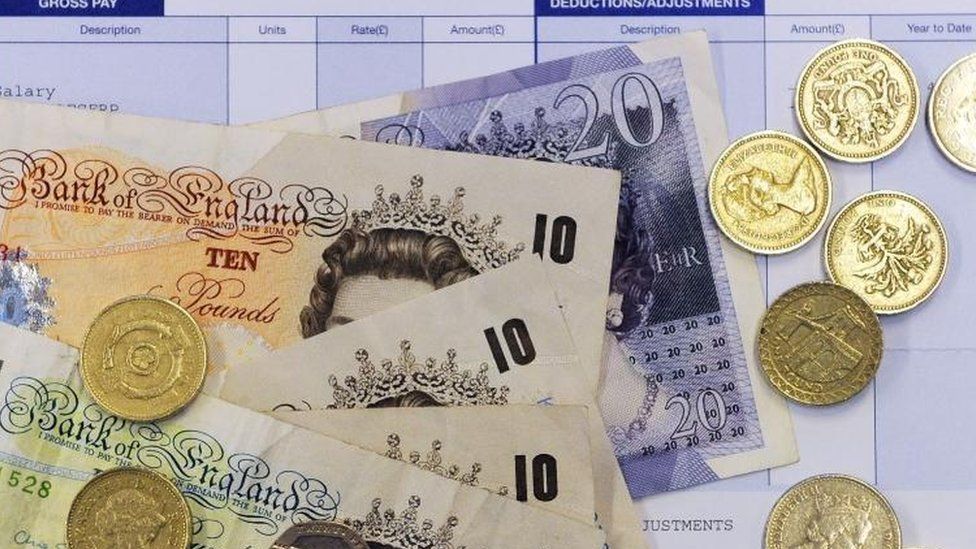Two million workers receive 4% pay rise
- Published

Minimum pay for workers aged 25 and over is rising by more than 4% as the National Living Wage increases from £7.20 an hour to £7.50.
For somebody working full-time, the 1 April increase means a pay rise of nearly £600 a year to about £14,625.
But business groups have again raised concerns that prices may rise to cover the cost.
Meanwhile pay levels in general are failing to keep pace with the rising cost of living.
Job fears
The rise comes on the first anniversary of the introduction of the National Living Wage which increased minimum pay sharply for workers aged 25 and over.
The National Minimum Wage, which began in 1999 and now covers workers aged 16 to 24 and apprentices, is also rising by 5p or 10p an hour from now depending on age.
This means 21 to 24-year-olds will only receive a 1.4% pay rise, and 18 to 20-year-olds will get a rise of less than 1% - although the minimum wage did rise significantly in October.
When both policies were introduced business groups raised fears that the extra burden would lead to job losses.
Yet, in a report last year, the Low Pay Commission said that there was "no clear evidence" of an impact on employment.
In fact, it said that sectors with low-paid workers such as retail, cleaning and horticulture had seen employment rise.
Disappearing perks?
Some workers have been critical of companies that have changed pay deals in the last two years, so reducing some of the benefit from the minimum wage rise.
One long-serving supermarket worker has said she is £100 worse off every month.
"My employer decided they would cut hours on Sundays and Bank Holidays from double time to time-and-a-half," said the worker, whose name we have not used.
"I work 25 hours a week. Almost a third of those hours are on a Sunday."
She hit financial difficulties and sought help from debt charity Christians Against Poverty.
'Price rises'
The CBI, which represents businesses and suggested the introduction of the National Living Wage was a "gamble", said it was supportive of a living wage but research suggested half of its members had been impacted by the rising minimum pay level.
This meant job creation had not risen as fast as may have been the case.
More significantly, the extra cost had resulted in price rises, restrictions on other staff rewards and perks, and scaling back investment.
Inflation has actually been well below the government's 2% target for much of the last year, and retailers said they were required to compete on price while paying some staff more.
The British Retail Consortium said: "It is important to recognise the significant additional costs associated with the policy. Our analysis shows that, across the retail industry as a whole, the National Living Wage costs up to £1.5bn to £3bn a year.
"Another uplift in the policy comes at a time of increasing competition, nearly four years of price deflation in shops and within an industry with very small profit margins. Therefore, it is important that future increases in the National Living Wage take account of wider economic conditions and are manageable for retailers."
Regular pay
Average pay rates for all ages have been creeping up but have outstripped the rising cost of living for some time.
Experts are predicting a sustained period during which prices will rise faster than wages, leaving people worse off in real terms.
This is particularly acute for public sector workers. Earlier this week, the NHS pay review body recommended a 1% pay rise in line with the government's restriction on public sector pay.
The latest official statistics showed that rising average regular pay, before bonuses, matches the inflation rate, at 2.3%.
Closer inspection of the data shows that this was made up of a 1.4% average pay rise in the public sector compared with a 2.6% rise in the private sector.
Traditionally, the route to a significant pay rise has been moving jobs.
However, the Resolution Foundation think-tank suggests that inertia and stuttering pay growth - particularly for younger workers who started work during the recession - may continue for some time.
"We'd usually see some kind of bounce-back for wages or people starting to move jobs more. That hasn't happened as quickly as we would expect," said Conor D'Arcy, policy analyst for the Resolution Foundation.
"One of the key questions for the next few years is whether we will start to see people in general - but particularly younger workers - start to move around more trying to find higher wages, and that having a positive upward pressure on wages.
"Or will we see this becoming the new normal, with people either not confident enough to swap jobs or just happy where they are?"
New minimum pay rates:
£7.50 per hour - 25 yrs old and over (National Living Wage)
£7.05 per hour - 21-24 yrs old (National Minimum Wage)
£5.60 per hour - 18-20 yrs old
£4.05 per hour - 16-17 yrs old
£3.50 for apprentices under 19, or 19 or over who are in the first year of apprenticeship
You can hear the full story on Money Box on BBC Radio 4 on Saturday at 12:00 BST or on Sunday at 21:00 BST
Are you getting a pay rise? We'd love to hear from you. Get in touch by emailing haveyoursay@bbc.co.uk, external
You can send your pictures and video to yourpics@bbc.co.uk, external
You can also contact us in the following ways:
Tweet: @BBC_HaveYourSay, external
WhatsApp: +447555 173285
Text an SMS or MMS to 61124 (UK) or +44 7624 800 100 (international)
- Published31 March 2017
- Published15 February 2017
- Published28 November 2016